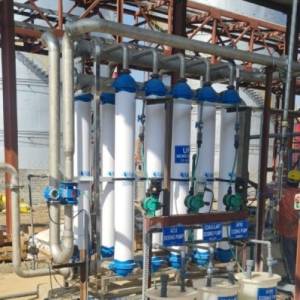Description
Ultrafiltration: Superior Water Purification for Diverse Applications
Ultrafiltration (UF) is a membrane-based water treatment process renowned for its effectiveness in removing suspended solids, colloids, bacteria, and larger viruses from water sources. This advanced technology utilizes a semi-permeable membrane with precisely sized pores, allowing smaller molecules like dissolved salts and minerals to pass through while effectively rejecting larger contaminants. This results in cleaner, safer water ideal for a wide range of applications.
Key Features and Benefits:
- High-Efficiency Particle Removal: UF membranes boast superior efficiency in removing particles ranging from 0.01 to 0.1 microns, significantly reducing turbidity and improving water clarity. This is crucial for applications where even microscopic contaminants are undesirable.
- Effective Bacterial and Viral Reduction: UF systems provide a significant barrier against bacteria and larger viruses, significantly enhancing water safety and reducing the risk of waterborne illnesses. While not a complete replacement for disinfection, UF significantly minimizes the microbial load.
- Reduced Pre-Treatment Needs: Compared to other membrane processes like reverse osmosis (RO), UF often requires less pre-treatment, simplifying the overall system design and lowering operational costs. This makes it a cost-effective solution for various water sources.
- Low Energy Consumption: UF operates at relatively low pressures, resulting in significantly lower energy consumption compared to other pressure-driven membrane processes. This translates to reduced operating costs and a smaller environmental footprint.
- Versatile Applications: UF finds application in a broad spectrum of industries and sectors including:
- Municipal Water Treatment: Improving the quality of drinking water sources.
- Industrial Wastewater Treatment: Removing pollutants and improving effluent quality before discharge.
- Food and Beverage Processing: Clarifying liquids and removing bacteria from food products.
- Pharmaceutical and Biotechnology: Purifying water for use in manufacturing processes.
- Swimming Pool Water Treatment: Maintaining clean and hygienic pool water.
Membrane Types and Configurations:
UF membranes are available in various configurations, including:
- Hollow Fiber Membranes: High surface area to volume ratio, suitable for large-scale applications.
- Spiral Wound Membranes: Compact design, offering high filtration capacity in a smaller footprint.
- Plate and Frame Membranes: Easy to clean and maintain, ideal for smaller applications.
The choice of membrane type depends on the specific application, desired throughput, and required level of purification.
System Design and Operation:
UF systems typically consist of a feed pump, a membrane module housing, a permeate collection system, and a concentrate discharge system. Operation involves pumping the water source through the membrane module under pressure. The clean water (permeate) passes through the membrane, while the rejected contaminants (concentrate) are discharged separately. Regular cleaning and maintenance are essential for optimal performance and extended membrane life.
Conclusion:
Ultrafiltration offers a robust and efficient solution for a wide range of water purification needs. Its ability to remove a broad spectrum of contaminants, coupled with its relatively low energy consumption and versatility, makes it a valuable technology for enhancing water quality and safety across diverse industries. Contact us today to discuss your specific application and explore how our ultrafiltration solutions can benefit your operations.
